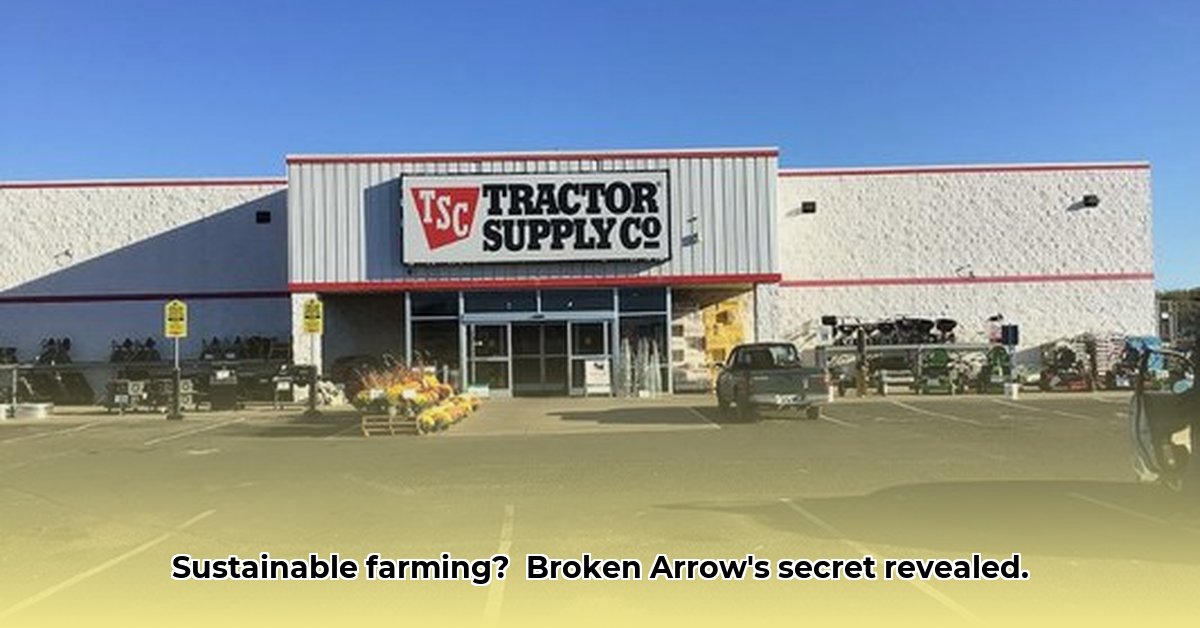
Tractor Supply Company Broken Arrow: A Case Study in Local Sustainability
This case study analyzes Tractor Supply Company's (TSC) Broken Arrow, Oklahoma, location and its contribution to sustainable agriculture within the community. It examines TSC's product offerings, accessibility, limitations, and opportunities for improvement in supporting local farmers' adoption of environmentally friendly practices. The analysis weighs the convenience of TSC's local presence against the need for greater transparency and a wider selection of certified sustainable products. For a similar case study in another location, see this Cottonwood TSC analysis.
Tractor Supply's Product Offerings: A Mixed Bag
TSC Broken Arrow offers a broad range of products relevant to agriculture, including seeds, fertilizers, tools, fencing, and livestock feed. While the store carries some organic seed options – potentially exceeding 50 varieties – the exact quantity and proportion of sustainably sourced products remain unclear due to a lack of readily available data. The absence of comprehensive labeling regarding sourcing and sustainability certifications hinders a complete assessment of the store's overall contribution to sustainable agriculture. Furthermore, the availability of conventional farming inputs, while meeting some farmers' needs, potentially offsets the positive impact of the more sustainable options. This necessitates a more detailed inventory analysis to determine the true extent of sustainably-focused offerings.
Accessibility and Convenience: A Local Advantage
TSC's Broken Arrow location provides significant advantages for local farmers and gardeners. Its proximity reduces travel time and fuel consumption compared to larger, more distant retailers. This convenience is particularly beneficial for smaller operations with limited resources. However, accessibility alone does not guarantee the adoption of sustainable practices. Farmer education and the availability of suitable products remain crucial factors. This ease of access, while beneficial, needs to be paired with a committed effort toward providing truly sustainable options.
Limitations and Challenges: Transparency and Traceability Gaps
A significant limitation is the lack of readily available information regarding the sourcing and sustainability certifications of many products. Without clear labeling and transparency, it’s difficult to ascertain the environmental impact of individual products and the store's overall contribution to sustainable farming. Consumers are increasingly seeking transparency in their purchasing decisions and this information gap presents a significant challenge. Additionally, reliance on conventional farming inputs raises questions regarding the overall sustainability of TSC's offerings. The limited scope of this case study, focusing solely on the Broken Arrow location, also prevents a comprehensive assessment of TSC's company-wide commitment to sustainable agriculture.
Opportunities for Improvement: A Roadmap for a Greener Future
TSC can significantly enhance its contribution to sustainable agriculture in Broken Arrow through several key strategies:
Expand Sustainable Product Selection: Drastically expand the range of certified organic and sustainably sourced products, clearly labeling their certifications and origin. This direct action demonstrates a strong commitment and caters to growing consumer demand.
Implement Educational Initiatives: Partner with local agricultural experts or organizations to offer workshops and educational materials on sustainable farming practices. This proactive approach empowers farmers with the knowledge to adopt more environmentally responsible methods.
Improve Transparency and Traceability: Implement a comprehensive system for tracking product sourcing and sustainability certifications, making this information readily accessible to consumers. This increased transparency builds trust and encourages more conscious purchasing decisions.
Promote Sustainable Practices: Actively promote TSC's commitment to sustainable agriculture in marketing materials, highlighting the availability of eco-friendly products and educational resources. This direct messaging helps attract environmentally conscious customers and demonstrates a forward-thinking approach.
Impact on the Local Community: Fostering Sustainable Growth
Increased access to sustainable farming supplies through TSC could positively impact the Broken Arrow community in several ways:
- Enhanced Food Security: A more sustainable agricultural sector can bolster local food production and resilience.
- Reduced Environmental Impact: Decreased transportation needs and the adoption of sustainable practices reduce the carbon footprint of local agriculture.
- Cost Savings for Farmers: Access to locally sourced supplies can reduce transportation expenses and overall operational costs for farmers.
However, realizing these benefits hinges on TSC's willingness to adopt the improvements outlined above.
Conclusion: Potential for Positive Change
Tractor Supply Company in Broken Arrow possesses substantial potential to significantly contribute to sustainable agriculture within its community. However, realizing this potential necessitates proactive measures to address transparency gaps, expand the range of sustainably sourced products, and implement educational initiatives that empower local farmers. By embracing these improvements, TSC can play a pivotal role in promoting a greener and more prosperous agricultural future in Broken Arrow and beyond.